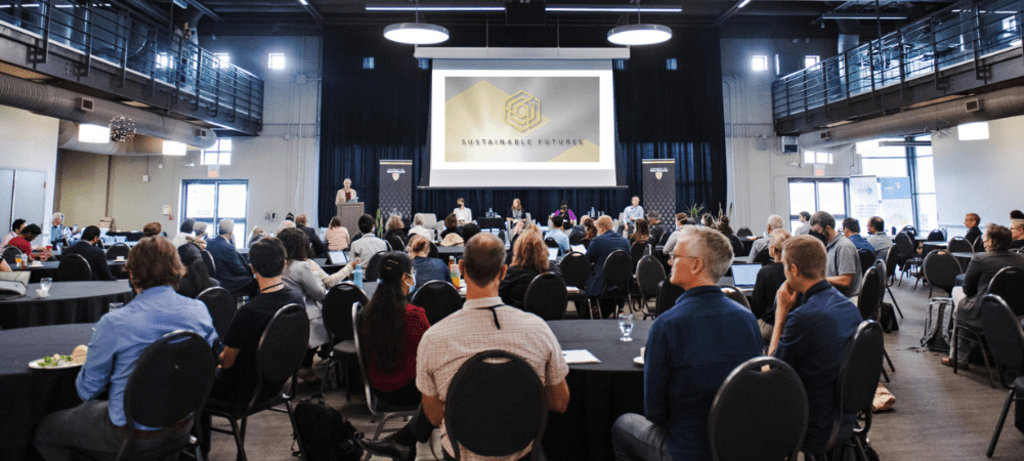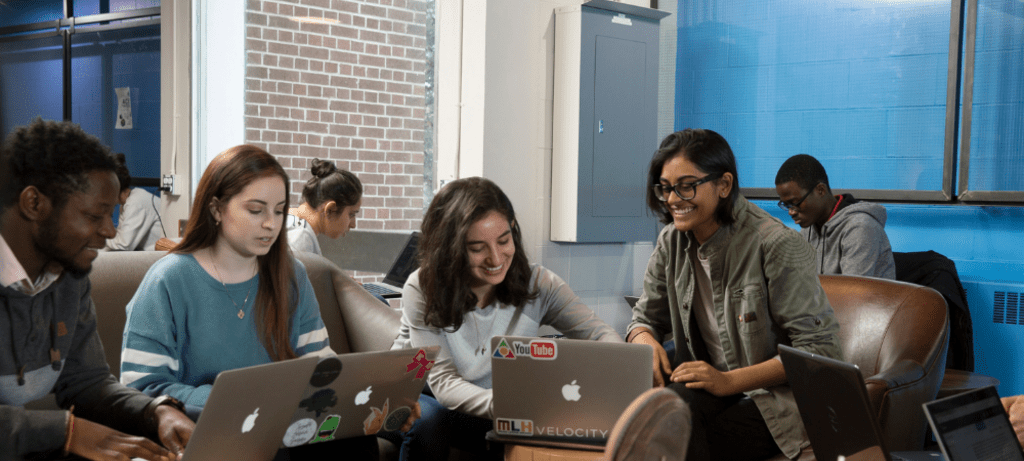Highlights from the Assembly of First Nations National Climate Gathering

Katherine Allaby is a Master of Environmental Studies in Geography student supervised by Waterloo Climate Institute member, Brent Doberstein. She attended the Assembly of First Nations Second National Climate Gathering and shared her key takeaways with the institute.
Estimated reading time: 5 minutes
Hosted by the Assembly of First Nations (AFN), the second National Climate Gathering: Preserving our Earth, Land and Water for Future Generations took place from September 27 to 29, 2022 in Fredericton, New Brunswick on the traditional unceded territory of the Wolastoqiyik, Mi’kmaq and Peskotomuhkati peoples. The AFN represents and advocates for the 634 First Nation communities and the more than 900,000 First Nations People in Canada1. The purpose of the National Climate Gathering was to “… bring together First Nation experts, leadership, youth, women, Elders, Knowledge Keepers and professionals from coast to coast to coast to work on the most urgent issue of our time: the climate crisis,” and to “… offer an opportunity to explore solutions that First Nations are advancing in the face of rapid change at local, regional, national and international levels.”2 Our hosts for the gathering were the people of St. Mary’s Wolastoqey community in Fredericton. The gathering was opened and sustained by the Drum Group Muskrat Singers and Dancers, as well as the voice of Passamaquoddy elder, teacher, and song carrier Elder Dr. Maggie Paul. Sakom (Chief) Allan Polchies Jr. welcomed us in various ways each day with his humour and warmth, giving special thanks to ‘Cousin Fiona’ (Hurricane Fiona) for giving us all a memorable welcome. The Wednesday night lobster dinner, caught and organized by the people of St. Mary’s, was a special gift of hospitality that was enjoyed by all.
Through funding from the Graduate Studies and Postdoctoral Affairs (GSPA) Graduate Studies Conference Assistantship (GSCA) I was able to attend the Climate Gathering in association with a NFRF-E (New Frontiers in Research Fund – Exploration) funded project entitled Water is Our Friend: Flood-Resilient and Climate-Adaptive Amphibious Housing for Indigenous Populations in Canada. Waterloo Climate Institute members, Dr. Brent Doberstein and Dr. Elizabeth English, are principal investigators for the project. I had the privilege of attending this gathering alongside Dr. English, and project collaborator Emily Dicken from the Canada North Shore Emergency Management Program.
To set the stage for the first and second days of the gathering, panel presentations on the First Nations Climate Lens took place. As part of framing the First Nations Climate Lens, Dr. Deborah McGregor (Anishinaabe) highlighted that First Nations people experience climate change in a holistic way that can not be truly measured by science. In a session on “First Nations Facing Flooding in Canada” Dr. Myrle Ballard of the University of Manitoba shared her personal experience with the impacts of climate change as she told the story of the flooding of her ancestral community of Lake St. Martin First Nation. Throughout her emotional recounting she highlighted the complex trauma that is so often overlooked in flood and disaster responses. She notes that people must be on the land to be healthy and that when they are displaced by flood events the damage is much greater than the loss of a house. At the end of her presentation, she left us with the powerful truth that: “When the land is traumatized, the people are traumatized. When the land is traumatized, the land cries.”

The Youth of the Yukon First Nations Climate Fellowship presenting a short film on their work and their purpose while attendees enjoy a lobster feast. Photo courtesy of the author.
The hope and guidance of the youth were the shining light of the gathering. Skaydu.û of the Teslin Tlingit Council and a Fellow from Yukon First Nations Climate Fellowship spoke of the work that the youth in the Yukon are doing to reconnect with themselves, the land, their communities, and their ancestors. They challenged us all to consider: “What does reconnection mean to you?”. Elder Albert Marshall emphasized in his keynote address that through (re)connection, Indigenous people develop a special kinship and an inherent responsibility to the land. To learn more, watch the youth's Reconnection is Climate Action video.
I had the pleasure of attending a session on “Engaging Indigenous Youth in Climate Plans and Initiatives” where a group of youth presented their short film, Climate Crisis: An Indigenous Perspective, which was filmed along Deshkaan Ziibii (Antler River) in Chippewa of the Thames First Nation. They spoke in their panel on eco-anxiety, Indigenous futurism, the importance of language and traditional knowledge, and how the youth are reclaiming their roles as the caretakers of Mother Earth. The youth emphasized that their resiliency reflects their knowledge, and that resiliency is strengthened through action. An illustrative story was passed on by Hilary McGregor of Whitefish River First Nation: that like the beaver who responds to the sound of water by building her dam, consequently creating a thriving home for so many other species, the strengths and knowledge of Indigenous Peoples benefits all.
On the second day of the gathering, Janene Yazzie, Southwest Regional Director of NDN Collective and member of Navajo Nation, asked the audience: “What if the best days of our people are in front of us and not behind us?” Throughout the AFN second National Climate Gathering, the significance of language, self-determination, relationships, and reconnection were emphasized and celebrated as key to addressing the climate crisis and ensuring a future for seven generations to come. Elder Albert Marshall noted in his keynote address that his concept of “Two Eyed Seeing”, where “western” science and traditional Indigenous knowledge are used in collaboration, must be action orientated to be meaningful. The inherent responsibility of Indigenous Peoples, and their holistic connection to the land, drives action and is one significant reason why Two-Eyed Seeing is so valuable, and why Indigenous People need to be leading climate action. For non-Indigenous allies, Regional Chief Kluane Adamek (AFN Climate Change and Environment lead, and citizen of Kluane First Nation) shared an important message that should be understood, especially by those of us working in the environmental field. She stated: “It has to be us [Indigenous People] leading the way,” the role of non-Indigenous allies is to “step behind us” or, if asked, “to step beside.”
References
Assembly of First Nations. (2022a). About AFN. Retrieved from https://www.afn.ca/about-afn/
Assembly of First Nations. (2022b). Save the Date: 2nd National Climate Gathering. Retrieved from https://www.afn.ca/wp-content/uploads/2022/06/AFN-Climate-Gathering-Save-the-Date_EN_FINAL.pdf
Contact us for media inquiries to learn more about this or other climate change related stories.

